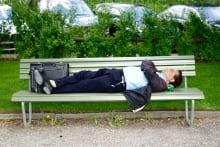By: Riley Swab
Sleep is necessary to increase focus and productivity, both vital traits to workers. Japanese workers, however, are accumulating massive sleep debts (i.e., consistently sleeping less than 7 hours per night without rebound sleep such as naps or sleeping in) due to a prevalent mentality that sacrificing sleep means you are working hard (Lewis, 2018). The issue has become so prevalent that in 2014, Japan’s Ministry of Health, Labor, and Welfare acknowledged the existence of a “sleep is expendable” attitude in many Japanese workers (Lewis, 2018). The report, in fact, claimed that 71 percent of Japanese adult male workers slept less than seven hours a night (Lewis, 2018). Although Japanese workers’ lack of sleep has reached an extreme state, a lack of sleep in workers is not unique to Japan. The CDC collected sleep data in 2014 and found that 40% of American adults were getting less than seven hours of sleep (the minimum recommended by the CDC for the best health and wellbeing) a statistic that pushed the CDC to label sleep deprivation as a public health epidemic in the United States (Center for Disease Control, 2017; Howe, 2017).
What does this mean for workers? Not getting enough sleep impairs brain function, reducing a person’s ability to make rational judgements (Lewis, 2018), reducing worker productivity (Lewis, 2018), and even increasing chances of developing arthritis, depression, and suicide (Center for Disease Control, 2017). In addition, those who do not sleep the minimum required hours are at a greater risk for obesity, heart attacks, strokes, and diabetes (Center for Disease Control, 2017). Although a lack of sleep impairs the individual workers, these individual impairments are adding up and impacting the entire Japanese workplace, even extending to their economy. Rand Corporation conducted a study in 2009 to quantify the cost of insufficient sleep in Japanese workers (Lewis, 2018; Hafner, Stepanek, Taylor, Troxel, & Van Stolk, 2016). Their study suggested that Japan loses 138 billion US dollars per year (the equivalent of 2.92% of Japan’s gross domestic product) because of the higher mortality risks and productivity losses resulting from the sleep shortage (Lewis, 2018; Hafner, et al., 2016). According to Rand Corporation’s 2009 study, the United States is estimated to lose $411 billion a year because of problems associated with deficient sleep in workers (Lewis, 2018; Hafner, et al., 2016).
This worrisome change in the sleep patterns of workers holds major implications for modern organizations and economies. Fortunately, some companies are creating systems that reward and encourage workers to sleep. These attempts range from providing a raise for workers who sleep at least six hours a night, to installing rooms in the workplace dedicated to napping (Fleming, 2018). In addition, Japan’s Ministry of Health, Labor, and Welfare issued guidance for employers in how to encourage employees to sleep more, primarily through educating both employers and employees about the benefits of getting enough sleep (Fleming, 2018; Lewis, 2018). Moving forward, we suggest organizations take steps to further encourage employee health and wellbeing, including sleep hygiene.
References
Center for Disease Control. (2017). Short Sleep Duration Among US Adults. Retrieved from https://www.cdc.gov
Hafner, M., Stepanek, M., Taylor, J., Troxel, W. M., & Van Stolk, C. (2016). Why sleep matters — the economic costs of insufficient sleep: A cross-country comparative analysis. Retrieved from www.rand.org/giving/contribute
Howe, N. (2017, August 18). America The Sleep-Deprived. Retrieved from https://www.forbes.com
Lewis, L. (2018, November 19). Japan wakes up to sleep shortage problems. Retrieved from https://www.ft.com
Fleming, S. (2018, November 28). To combat Japan’s sleep debt, some firms allow tired workers to nap on the job. Retrieved from https://www.weforum.org

